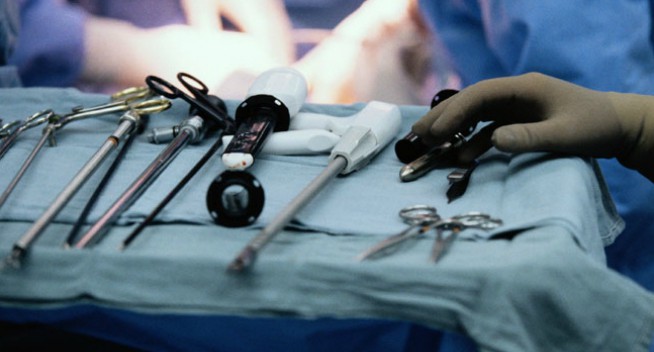
U.S. regulators have strengthened their warning against use of a once-popular device for gynecologic surgery that can spread unsuspected cancer, saying its risk is only justified in a fraction of patients.
The Food and Drug Administration is updating its April safety warning, now saying doctors should not use the devices, called laparoscopic power morcellators, for performing a hysterectomy or removing uterine fibroids “in the vast majority of women.”
The FDA’s Dr. William Maisel said there are safer options for the procedures for most patients. He did point out that the device may be appropriate for a small number of women who need to have fibroids removed, but want to protect their uterus in case they decide to have a baby in the future. Fibroids are benign — but sometimes painful — tumors in the wall of the uterus.
Dr. Maisel said the FDA is recommending that makers of laparoscopic power morcellators immediately include in the detailed product guide new safety information: a boxed warning on the risks and two contraindications on when the devices should never be used, which would cover most patient cases.
“The FDA’s primary concern is the safety of patients,” said Dr Maisel . “We want all women with uterine fibroids to be aware of this risk.”
Fibroids are relatively common in older women, but generally don’t have to be removed if they’re not causing problems such as excessive menstrual bleeding, pain and anemia.
Power morcellators had become popular because they enable removal of fibroids, or the entire uterus, with less-invasive surgery. They function something like a hand blender, chopping tissue inside the abdomen into tiny pieces that can be removed through keyhole incisions, rather than having to cut open the abdomen or remove the uterus through the vagina.
But the procedure can free cancer cells lurking in the uterus or in fibroids, spreading them to multiple parts of the abdomen.
The FDA does not have firm figures on how often this has happened, but the agency has received about two dozen reports of such cases since last December, Dr. Maisel said. It now estimates that in about one of 350 procedures using power morcellators, tissue considered benign turned out to be cancerous.
Dr. Maisel said about 50,000 procedures a year were done using the devices in this country, but that’s likely declined in recent months due to the risks.
The American College of Obstetricians and Gynecologists said in a statement it was pleased the FDA is enhancing patient safety while allowing use of the device for some women, “sparing them the longer recovery time and higher mortality rates associated with a total abdominal procedure.”
Johnson & Johnson, which had been the top manufacturer of the devices in the U.S., directed surgeons to stop using its device for the procedures in April, when concerns about inadvertently spreading cancer inside women’s abdomens first arose.
Meanwhile, law firms specializing in medical injury cases have been filing lawsuits on behalf of patients harmed by the device.
The new boxed warning is to state that uterine tissue may contain undetected cancer cells, so use of morcellators can spread the cancer and reduce the woman’s chances of survival.
The FDA also wants the product instructions to note that the devices should not be used to remove uterine fibroids in women who are going through or have completed menopause, or are good candidates to have the tissue removed intact — the two main groups of women affected. The devices also should not be used when the tissue involved is suspected or known to be cancerous.
“We’ll continue to consider other steps that may help discourage risk of spreading unsuspected cancer,” Maisel said.
The agency had an outside panel of experts review the situation in July and took that information and comment by doctors and patients into account in producing the new warnings. Dr. Maisel said it’s the first time that the FDA has used its power to put a safety recommendation into effect immediately.
